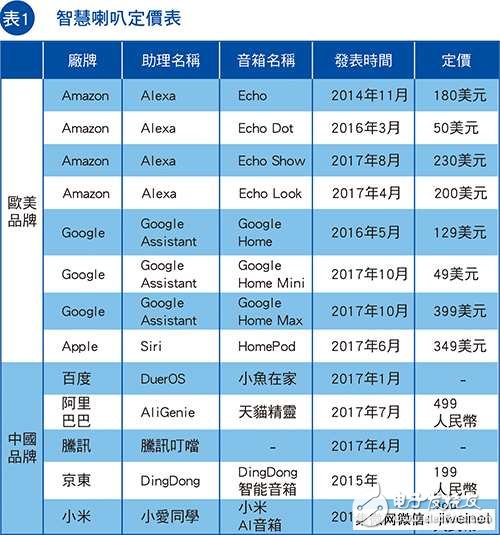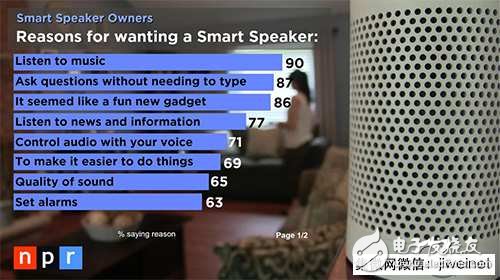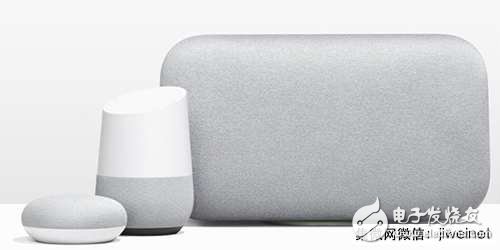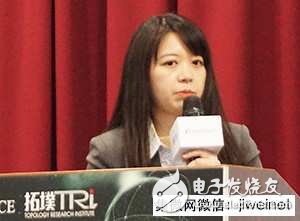In recent years, major brands in the English market have published their own voice assistants and smart speakers. In addition to the artificial intelligence (AI) technology that has begun to be used in the home field, it also announced that the era of voice man-machine interface has come. The development of Chinese speech recognition technology is more difficult than English. People's living habits and needs for smart homes are also different. Therefore, local manufacturers consider different from Europe and the United States when developing technology and expanding the Chinese market. Since Amazon released the smart speaker Echo in 2014, it has brought a new imagination to the combination of smart home and voice assistant. Google, Apple and other big companies have also joined the battle to launch smart speakers with various market positioning (Table 1). According to the research report of the market survey agency Global Market Insights, the global smart speaker market size was 400 million US dollars in 2016, and it is expected to grow rapidly to 13 billion US dollars by 2024. The smart speaker market is promising and the growth rate will be very fast. In addition, the Taipei Computer Association, the co-host of COMPUTEX TAIPEI, also released news recently that it has seen many endpoint AI devices, voice assistant solutions, etc. since opening the online registration of the 2018 exhibition in September 2017. Innovative application product manufacturers exhibited. The Taipei City Computer Association further analyzed that this trend is due to the maturity of artificial intelligence voice assistants (Voice Assistant). Smart speakers can provide more complete labor by interfacing with voice assistant functions, together with search, query and shopping guide functions Smart life services. As far as the Chinese market is concerned, major Chinese Internet giants have also released their own smart speaker products since 2015. And like the European and American markets, each has its own market advantages. For example, both Alibaba and Amazon already have a considerable market share in the e-commerce market. Through smart speakers, consumers can experience a more complete shopping service through different channels; Xiaomi is similar to Apple before it launched smart speakers Accumulate a lot of hardware devices that are well-recognized by the market. With smart speakers, there can be a more complete series connection between hardware, allowing consumers to achieve a more intelligent home life. To promote the realization of smart homes, it must be perfectly connected with the real life model in order to create consumer demand. According to data provided by NPR And Edison Research, 87% of users who have purchased smart speakers expect to be able to search for information through the voice input interface. It can be seen that Chinese speech recognition technology is the first technical barrier that must be broken through in the Chinese market (Figure 1). Figure 1 Statistics of purchase purpose of smart speaker users Multi-language cross-recognition meets the real-life situation in Taiwan Zhang Zhenkui, deputy head of the Technology Promotion Department of the Institute of Information Technology of the Industrial Technology Research Institute, pointed out that the Industrial Technology Research Institute has integrated the speech recognition technology that has been developed for many years since the fourth quarter of 2016, and developed the ITRI voice assistant. I look forward to developing a voice assistant that best meets Taiwan's living habits with my understanding of the place. Compared with the voice assistant and smart speaker products launched by international brands, ITRI voice assistant has been able to achieve more accurate Chinese voice recognition. Currently, multi-language recognition is being actively developed. In the future, if users include Chinese or Taiwanese words in Chinese sentences, ITRI voice assistant can also accurately recognize user commands (Figure 2). Figure 2 Zhang Zhenkui, deputy team leader of the Technology Promotion Department of the Institute of Information Technology of the Industrial Technology Research Institute, pointed out that the ITRI voice assistant has been able to achieve more accurate Chinese speech recognition than major international manufacturers. In the future, ITRI voice assistants will continue to develop more language recognition functions such as English and Taiwanese, and continue to develop market applications. The semantic understanding of Chinese will be the focus of continuous optimization. First of all, since dialects in different countries or regions will have different ways of using French and French, the Institute of Industrial Technology will combine machine learning technology to quickly expand the semantic database of different languages. Furthermore, in the context of using smart speakers, it is often the case that all family members use one device together. Therefore, it is also the development focus to achieve the speaker recognition function through voiceprint recognition technology, so that the smart speaker can collect complete and correct user behavior data. Finally, the tone of emotion of the user will also be one of the development priorities in the future; by the tone of the user's input information, the urgency and emotional change of the user when the instruction is issued are not known through other human-machine interfaces. Therefore, intonation mood will be one of the precious data that speech recognition can collect in the future. Zhang Zhenkui analyzed that although Taiwan's market is relatively small, it still has its market to be developed by manufacturers. Most of the relevant manufacturers in Taiwan use OEM export as their main source of profit. Many Netcom companies that manufacture routers and other products have also begun to OEM smart speakers and export them. In addition to hardware production technology, Taiwan also has a fairly mature e-commerce platform; content services such as music, movies, and books provided by telecom operators are also quite complete. As far as the elements of the successful business model of smart speakers in Europe and the United States are concerned, Taiwan can also provide quite complete services in the same field. Different profit models for smart speakers in the Chinese market Although the main profit model of Amazon Echo, which has been operating the market for the longest time, is still a shopping guide for e-commerce platforms, statistics from NPR And Edison Research indicate that 90% of smart speaker users said that listening to music is one of the reasons for their purchase At the Made by Google conference in 2017, Google launched Google Home Max, which advertises high-quality audio as Apple HomePod (Figure 3). In 2017, Amazon launched more smart speakers with different functions, such as Echo Show with lens and Echo Look with display. As the data collected by major manufacturers is gradually complete, the market positioning of the new generation of smart speakers is more precise. Next, in the European and American markets, how smart speakers will use voice assistants as the core to expand technical functions and market positioning is worthy of continued attention. Figure 3 In 2017, Google launched Google Home Max, which advertises high-quality sound effects, and Google Home Mini, which has a lower unit price. Image source: Google In addition, the smart speakers launched by Baidu, Alibaba, Tencent, and Xiaomi in 2017 have grown substantially in the Chinese market. NXP ’s Senior Marketing Manager of the Microprocessor and Microcontroller Division in Greater China, Zhang Xiaoping, predicts that the Chinese market will grow faster in 2018 than in 2017, with approximately 20 million smart speakers on the market (Figure 4). Figure 4 Zhang Xiaoping, senior marketing manager of NXP's Greater China Microprocessor and Microcontroller Division, estimates that the Chinese market will grow more rapidly in 2018 than in 2017. However, whether it is in China or the global market, the popularity of smart speakers needs to be improved. Zhang Xiaoping believes that the current low accuracy of Chinese semantic understanding is the main reason why smart speakers cannot be popularized. For example, current smart assistant services often need to say awake words before they can start to input information by voice, but this is not the most intuitive way to use it. Zhang Xiaoping predicts that in the future, wake words will be eliminated by the optimization of voiceprint recognition and intelligent recognition technology; when the voice assistant can judge voice commands in a manner that recognizes the user's voiceprint and analyzes the context, the voice closest to natural human behavior can be achieved Human-machine interface. However, since the smart speakers of Chinese brands are all listed at relatively low prices, they are of great help to the education and promotion of the market. Although the artificial intelligence level requirements of this technology are quite high, Zhang Xiaoping predicts that this technology will have an important breakthrough before 2020 to achieve the ultimate product type of speech recognition. Zhang Xiaoping further pointed out that users of different generations have different characteristics. For Digital NaTIve born after 1990, the situation of the Internet of Everything will be taken for granted. As they become the backbone of society, the era of smart homes will follow. In the current smart speaker market in China, competition has already become the Red Sea. However, at present, it is more important for manufacturers to obtain more data to modify the voice processing ability than to profit from selling hardware. Zhang Xiaoping believes that, driven by the Chinese Internet giant, after another 1-2 years of data accumulation, smart speaker and voice assistant technology will be greatly improved, and users will be more familiar with voice man-machine interfaces. The product appears. On the other hand, Zhang Xiaoping pointed out that in terms of smart homes, Xiaomi has the most complete layout and has established a complete ecosystem. As soon as 2018, it can see a substantial growth in market share. Baidu is expected to win the Chinese voice assistant market Lin Zhenyu, an analyst at Tuoji Industry Research Institute, believes that among the many cloud service companies in China, Baidu's layout is the most worthy of attention. Baidu's intelligent voice assistant DuerOS, supported by Baidu's two major cloud services, Baidu's intelligent cloud and Baidu brain, adopts an open platform approach to provide developers with tools, data and development environment, trying to establish a complete manual like Amazon and Google in China Intelligent ecosystem (Figure 5). Figure 5 Lin Zhenyu, an analyst at Tuoji Industry Research Institute, believes that among China's many cloud service companies, Baidu's layout is the most worthy of attention. Among China's three largest cloud service providers (Baidu, Alibaba, Tencent), Baidu's attitude is relatively the most positive. Baidu shouted the "All in AI" slogan at the 2017 AI Developer Conference, announcing that it will continue to develop artificial intelligence and continue to develop relevant markets. The promotion of DuerOS is one of the key projects in Baidu's artificial intelligence business. Lin Zhenyu pointed out that at present many companies want to invest in the smart home and smart speaker market, but the profit model needs to be rethought; Baidu's open platform business model has strong competitiveness and promising prospects. Baidu provides an open platform that will quickly obtain a large amount of data, and then optimize DuerOS functions. The most noteworthy thing is that, as long as the software is updated, the smart home appliances equipped with Amazon Alexa can be converted to the Chinese interface of DuerOS within one minute. Therefore, DuerOS can not only be promoted in the Chinese domestic market, but overseas Chinese can also use the DuerOS voice assistant service in this mode. In the development process of voice man-machine interface, the use of smart speakers in the home field is only the first step. Smart speakers must be successfully popularized before consumers will get used to using language to communicate with the machine, and then more will be developed. The application of the voice interface is possible. Modified Sine Wave Solar Inverter Modified Sine Wave Solar Inverter,Modified Sine Wave Inverter 800W,Ac Inverter For Automobile,Modified Sine Wave Home Inverters GuangZhou HanFong New Energy Technology Co. , Ltd. , https://www.gzinverter.com




